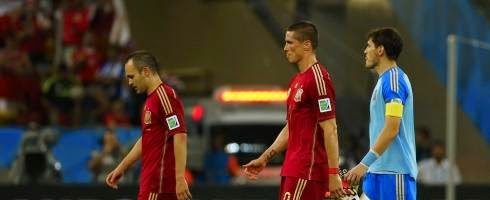FACT FILE
- Date of birth: September 1, 1995
- Place of birth: El Escorial, Spain
- Height: 5ft 9in
- Position: Forward
- Clubs: Barcelona B, Barcelona; 1 app, 1 goal
- National: Spain U19; 3 caps, 3 goals
- Date of birth: September 1, 1995
- Place of birth: El Escorial, Spain
- Height: 5ft 9in
- Position: Forward
- Clubs: Barcelona B, Barcelona; 1 app, 1 goal
- National: Spain U19; 3 caps, 3 goals
The 60 second story
It's perhaps ironic that Barcelona’s newest star was born in San Lorenzo de El Escorial, a small town within the autonomous community of Madrid. Now, nearly 19 years later, Munir El Haddadi finds himself labelled as the next big thing at Real Madrid’s fiercest rivals.
The 18-year-old’s rise to stardom is an interesting one. Aged 15, El Haddadi – of Moroccan heritage – was snapped up by Atletico Madrid after impressing on trial. Yet, for reasons unknown, he was shipped out on loan to fourth-tier Rayo Majadahonda – a stint which would play a pivotal role in his short career to date.
During his time with the Madrid minnows, Munir scored 32 goals in 29 matches. Unsurprisingly, his form sent alarm bells ringing all over Europe; from England, the likes of Manchester City and Arsenal took interest in the starlet, while Paris Saint-Germain also showed interested.
However, it was when Barcelona found out that rivals Real Madrid were in the hot seat to sign the attacker that the Blaugrana came to the fore. Legend has it that, during negotiations, Real Madrid refused to provide him accommodation within their academy residencies. Barca, diplomatic as ever, offered him a place in their newly built €11 million facility. The choice was simple, and Munir inevitably headed north.
Why you need to know him
Since his arrival at La Masia, Munir has continued to impress and was given his chance to shine in the UEFA Youth League – the Under-19s version of the Champions League. On his debut he scored a brace against Ajax, before showcasing his striking prowess in several other impressive performances en route to the championship. He netted a brace in the final against Benfica, which included a magnificent strike from halfway in a comfortable 3-0 win.
<
Earlier this year the 18-year-old made his professional debut for Barca B, and netted four goals in 11 appearances last term.
Luis Enrique’s arrival as coach following the departure of Gerardo Martino was always going to be good for the youngster, and he was soon promoted to the first team. In addition, the suspension of Luis Suarez and Neymar’s injury meant the Spaniard has earned chances to prove his worth. By the end of pre-season, he was the Catalans' top scorer with four goals.
Strengths
Despite his young age, Munir exhibits maturity well beyond his years. At 5ft 9in, the teenager is a diminutive forward who exerts confidence and elegance on the ball. The left-footed attacker is pacey and, more often than not, has a trick or two up his sleeve.
It's his ability in front of goal which makes him most formidable, though – that aforementioned halfway wonder-strike is just one example of what he can do. Overall he is technically sound, and equally competent at taking set-pieces.
Weaknesses
Although brilliant with his left foot, Munir is less impressive with his weaker right. At times, despite finding himself in good goalscoring situations, his weaker peg lets him down.
They said...
"I had no fear about playing him," claimed boss Enrique after Barcelona's opening day 3-0 win over Elche. "He trains like he plays, he gives us a lot of options and he has a lot of character. He never rests. But let's not get carried away, he still has a lot to do."
Did you know?
As a youngster, Munir often looked up to his team-mate “the excellent Messi” as an idol, and tries to base his game on that of the former Ballon d’Or winner. Perhaps even more surprising is the fact he still looks up to QPR player Adel Taarabt, with whom he could yet play with internationally after opening the door to the country of his parents' heritage. With the way things are going at the moment, it might be Taarabt who says the same of the youngster in a few years’ time.
What happens next?
Fortune is on Munir's side. With Suarez suspended until late October and Neymar still recovering from an ankle injury, the door is open for the young attacker to prove his worth. Should he keep his momentum going, the chances will keep on coming – and so will the goals. Expect him to take La Liga by storm in the seasons ahead.



















